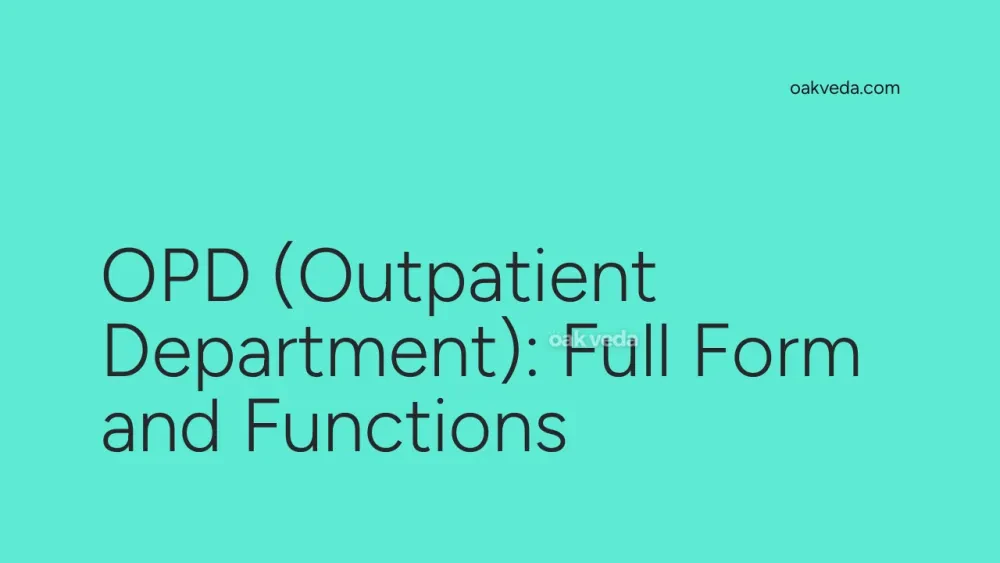
What is the Full Form of OPD?
The full form of OPD is Outpatient Department. This term is widely used in healthcare settings to describe a specific area of a hospital or clinic where patients receive medical care without being admitted for an overnight stay.
What is Outpatient Department?
An Outpatient Department, commonly known as OPD, is a crucial component of modern healthcare facilities. It serves as the primary point of contact between patients and medical professionals for various non-emergency health concerns. OPDs are designed to provide diagnostic, therapeutic, and follow-up services to patients who do not require hospitalization.
Origin and Development of Outpatient Departments
The concept of outpatient care has evolved significantly over the years. Historically, most medical treatments were provided in patients' homes or through extended hospital stays. However, as medical knowledge and technology advanced, the need for more efficient and cost-effective healthcare delivery became apparent. This led to the development of dedicated outpatient facilities within hospitals and standalone clinics.
How does an Outpatient Department work?
OPDs typically operate on a structured system to ensure efficient patient care:
- Registration: Patients first register at the reception, providing their personal and medical information.
- Triage: A nurse may assess the patient's condition to determine the urgency of care needed.
- Consultation: Patients meet with doctors in specialized departments based on their symptoms or medical history.
- Diagnostics: If required, patients undergo tests or imaging procedures.
- Treatment: Doctors provide prescriptions, minor procedures, or referrals for further care.
- Follow-up: Patients may be scheduled for future appointments to monitor their progress.
Types of Outpatient Departments
Most hospitals have multiple specialized OPDs to cater to various medical needs:
- General Medicine
- Pediatrics
- Obstetrics and Gynecology
- Orthopedics
- Cardiology
- Neurology
- Oncology
- Dermatology
- Ophthalmology
- ENT (Ear, Nose, and Throat)
Functions of Outpatient Departments
OPDs serve several critical functions in the healthcare system:
- Primary Care: Providing routine check-ups and managing common health issues.
- Specialized Consultations: Offering expert opinions in various medical specialties.
- Diagnostic Services: Conducting tests and examinations to identify health problems.
- Minor Procedures: Performing small surgeries and treatments that don't require hospitalization.
- Health Education: Offering guidance on preventive care and lifestyle management.
- Chronic Disease Management: Monitoring and treating long-term health conditions.
Applications of Outpatient Departments
OPDs are utilized in various healthcare scenarios:
- Preventive Care: Regular health check-ups and screenings.
- Acute Care: Treating sudden illnesses or injuries.
- Follow-up Care: Monitoring patient progress after hospitalization or procedures.
- Medication Management: Adjusting and prescribing medications for ongoing conditions.
- Referral Services: Connecting patients with specialized care when needed.
Features of Outpatient Departments
Modern OPDs are characterized by several key features:
- Efficient Patient Flow: Designed to minimize waiting times and optimize care delivery.
- Advanced Technology: Equipped with state-of-the-art diagnostic and treatment tools.
- Electronic Health Records: Maintaining digital patient records for seamless care coordination.
- Multidisciplinary Approach: Collaboration among various medical specialties.
- Patient-Centered Care: Focusing on individual patient needs and preferences.
Benefits of Outpatient Departments
OPDs offer numerous advantages to both patients and healthcare systems:
- Cost-Effective: Reduces healthcare expenses compared to inpatient care.
- Convenience: Allows patients to receive care without disrupting their daily routines.
- Reduced Risk of Hospital-Acquired Infections: Minimizes exposure to hospital environments.
- Faster Recovery: Enables patients to recuperate in the comfort of their homes.
- Improved Access to Care: Increases the availability of medical services to a broader population.
Limitations or Challenges of Outpatient Departments
Despite their benefits, OPDs face certain challenges:
- High Patient Volume: Can lead to long waiting times and rushed consultations.
- Limited Intensive Care: Not suitable for severe medical conditions requiring constant monitoring.
- Continuity of Care: Coordinating care among different specialists can be challenging.
- Resource Constraints: May face shortages in staff or equipment during peak hours.
Future Developments in Outpatient Department Technology
The future of OPDs is likely to be shaped by technological advancements:
- Telemedicine Integration: Expanding remote consultation capabilities.
- Artificial Intelligence: Enhancing diagnostic accuracy and treatment planning.
- Wearable Technology: Incorporating patient-generated health data into care plans.
- Virtual Reality: Improving patient education and treatment simulations.
- Robotics: Assisting in minor procedures and patient care tasks.
FAQs on OPD Full Form
-
What is the difference between OPD and IPD? OPD (Outpatient Department) provides care without overnight stays, while IPD (Inpatient Department) involves hospitalization for extended treatment.
-
Are all hospital visits considered OPD? No, emergency room visits and inpatient admissions are not considered OPD visits.
-
Can I get surgery done in an OPD? Minor surgeries and procedures can be performed in OPDs, but major surgeries typically require inpatient admission.
-
How long do OPD visits usually last? OPD visits can range from 15 minutes to a few hours, depending on the required care and procedures.
-
Is OPD care covered by health insurance? Many health insurance plans cover OPD care, but coverage may vary. It's best to check with your insurance provider.
In conclusion, Outpatient Departments play a vital role in modern healthcare, offering accessible, efficient, and cost-effective medical services. As technology continues to advance, OPDs are poised to become even more integral to healthcare delivery, improving patient outcomes and experiences.
You may be interested in:
- ESA (European Space Agency): Full Form and Overview
- TCP/IP (Transmission Control Protocol/Internet Protocol)
- SAT (Scholastic Assessment Test) Full Form
- ICICI (Full Form): Industrial Credit and Investment Corporation of India
- LLP (Limited Liability Partnership) Full Form
- CSS (Cascading Style Sheets): Full Form and Guide

